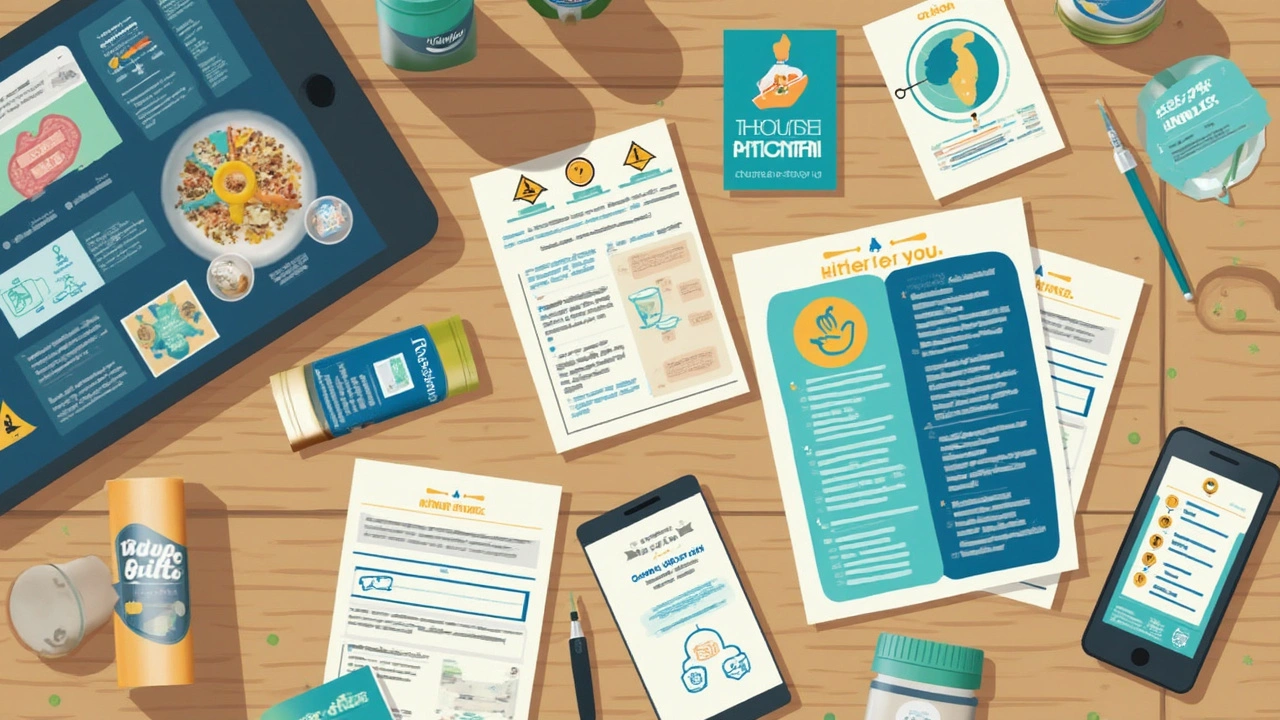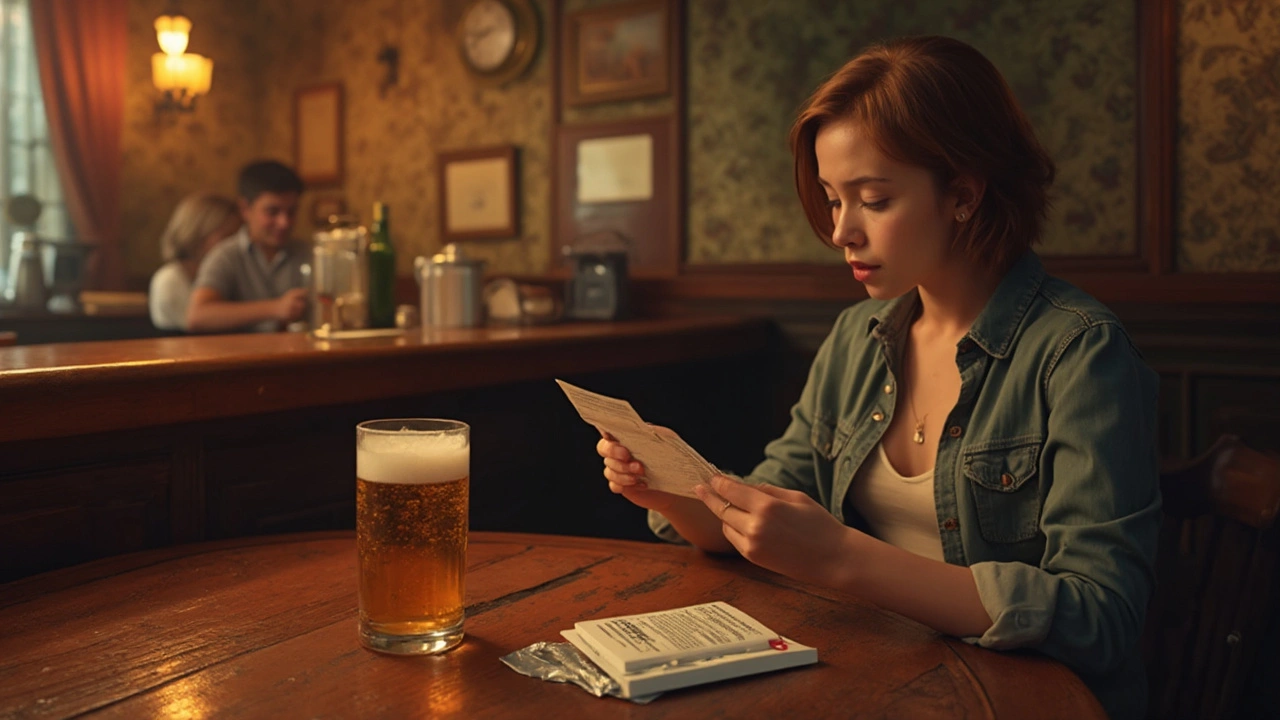Ever dashed to the medicine cabinet for antidiarrheals after a sketchy meal, then reached for a cold beer, thinking, "Hey, it’s just a pill and a drink"? You’re not alone. It feels like a harmless move—especially if you’re desperate for normalcy after a day of stomach drama. But this combo packs far more havoc than most folks realize. Mixing antidiarrheals like Imodium with alcohol isn't just risky—sometimes it’s downright dangerous. Most people treat diarrhea meds as gentle, reliable, the over-the-counter kind you don’t need to worry about. So the idea that your glass of wine or a couple of cocktails can tangle with them and make things worse isn’t something anyone warns you about. Seriously, when’s the last time a pharmacist stopped you and flat-out said, "Hey, don’t do that"? Yet the chemistry inside your body doesn’t care what feels casual. Some combos, especially with the wrong meal or another drug, will bite back—even hours later. I learned this when a close friend thought he’d "power through" food poisoning with Imodium at a bachelor party. Let’s just say his night did not end pretty (and the hotel was not happy with us). So what’s really behind all these warnings? What do you actually risk when you mix common antidiarrheal meds and alcohol?
Why Do People Mix Antidiarrheals and Alcohol?
Most people don’t do it on purpose, or with wild abandon. Out of routine, you pick up a box of Imodium from the shelf when your stomach starts gurgling and hope for the best—then a few hours later, a social situation rolls around. There’s pressure to show up, not be the "sick person" at the barbecue, to grab a beer and act normal, even when your insides feel like a washing machine. Maybe you take the medicine first, figuring it’ll have "worn off" by the time you head out.
Others see diarrhea as only a minor hurdle, easily fixed by some tablets. The label says, “may cause drowsiness,” but you brush it off, because you’re used to that warning on everything from allergy meds to cough syrup. And who reads the tiny print about alcohol, anyway?
Some believe that antidiarrheals only act locally in your gut, so why would mixing them with alcohol matter? But here’s the sneaky catch: meds like loperamide (the active ingredient in Imodium) don’t just work in the gut—they can have effects throughout the body, especially when taken in higher-than-recommended doses or in special situations. Alcohol also likes to "shake things up" inside your liver, gut, even your heart rate. It’s not a neutral passenger. In fact, studies show that loperamide’s side effects skyrocket when mixed with alcohol, including intense sleepiness, impaired motor skills, and erratic heart beats.
People struggling with irritable bowel syndrome (IBS) or frequent stomach bugs sometimes use antidiarrheals more often than the average person, so there’s even more overlap with social drinking occasions—holidays, family gatherings, travel. It’s not uncommon to see someone "prepping" for a long wedding weekend by packing both the meds and the minibar snacks. Social pressure, discomfort, and convenience team up to make risky choices look small.
Did you know—across North America, over 4 million people reach for an antidiarrheal medication every month? The overlap with occasional drinkers is much larger than most people think. And of those, hardly anyone checks if mixing the two has any real downside—until their body gives them a not-so-gentle warning.

How Mixing Antidiarrheals with Alcohol Can Backfire
Let’s talk about what’s really happening inside when you pair antidiarrheals with a drink. First, alcohol is a notorious wildcard. It slows digestion, makes you dehydrated, and can speed up or slow down how different substances get absorbed and processed. For antidiarrheals like loperamide, the situation is especially complicated. Usually, your body keeps most of the drug in your gut, but alcohol can make it easier for more to slip into your bloodstream—a recipe for trouble.
When more loperamide gets into the system, you risk classic opioid-like side effects: fatigue, dizziness, abnormal heart rhythms. Alcohol only worsens these issues. A study from the British Journal of Clinical Pharmacology found that people who drank after taking loperamide reported double the sleepiness and three times the impaired reaction time, compared to those who took the drug solo. It’s not just about falling asleep at the wrong moment—slowed reflexes and clouded judgment can turn driving or operating machinery into a huge risk.
It gets trickier when people push high doses of antidiarrheals. There are reports—yes, in the actual medical literature—of folks taking big amounts of Imodium plus alcohol, ending up with severe heart issues like arrhythmia or even cardiac arrest. Your heart’s electrical system isn’t designed for this double whammy.
Dehydration makes everything worse. Both diarrhea and alcohol increase your risk of becoming dangerously dehydrated. That means headaches, dizziness, kidney stress—and, ironically, even more gut issues. Your bowels can get "locked up" longer than you’d expect, leading to cramping and uncomfortable constipation later.
Here’s a real eye-opener: Around 4% of all emergency room visits related to antidiarrheal meds involved people who had been drinking. That’s roughly 12,000 people a year in the US alone, according to CDC figures. And those are just the ones that end up in the hospital.
So, can you mix Imodium and alcohol safely? The answer isn’t straightforward, but the risks are much higher than most people realize. For a full breakdown on what can happen (and why you probably shouldn’t risk it), check out this in-depth post about what happens when you mix Imodium and alcohol.
What about milder cases? Even if you dodge the dramatic stuff, low-level interactions can still ruin your night. Nausea, next-level exhaustion, feeling "off" and unable to focus—these aren’t rare. Some folks even mention feeling wired and anxious after the combo, thanks to unpredictable effects on the nervous system.
Let’s put some real numbers down. Take a look at the risks based on several published studies:
| Effect | Incidence without Alcohol | Incidence with Alcohol |
|---|---|---|
| Drowsiness | 8% | 21% |
| Nausea | 5% | 16% |
| Heart Rhythm Changes | 0.5% | 3.5% |
| Impaired Coordination | 2% | 10% |
| Hospitalization Required | 0.1% | 1.8% |
Those jumps might seem small, but if you’re one of those statistics, it won’t feel minor.

Tips, Facts, and What to Do Instead
If you’re dealing with gut trouble, it’s tempting to do anything for quick relief, especially if life doesn’t pause for your symptoms. But after seeing a few close calls—one with my brother-in-law who tried to "power through" food poisoning at a music festival, another with my wife Marianne who ended up feeling worse for wearing a brave face—I know it’s smart to make better choices.
- Wait it out: If you absolutely need antidiarrheals, avoid alcohol for at least 24 hours. Even small amounts of alcohol can mess with how your body absorbs and handles medication.
- Hydrate smarter: Diarrhea and alcohol both dry you out. Stick to water, electrolyte drinks, or herbal teas until you’re feeling better.
- Eat simple: Keep your meals bland for at least the first day. Alcohol irritates the gut lining, so combine it with complex, greasy foods and you’re asking for more chaos.
- Read those tiny labels: I know, it’s a hassle, but even over-the-counter meds can have strict “no alcohol” warnings hiding in plain sight.
- Know your body: If you have heart issues, any history of gut trouble, or sensitivity to drugs, be extra cautious. The risk isn’t worth it.
- Don’t double up: Taking more pills just because you’re drinking doesn’t help. In fact, upping the dose increases your chance of nasty side effects.
Some folks love to share “miracle” fixes online—wacky kombucha recipes, herbal shots, you name it. Most of these won’t mix any better with antidiarrheals and booze. When in doubt, ask your doctor or pharmacist—no judgment, they’ve heard it all before.
If you must be social and your stomach’s acting up, maybe grab a ginger ale or sparkling water. It looks like a fancy drink, helps settle your gut, and no one has to know it’s not loaded with vodka. Your body will thank you for it the next morning.
You see, the overlap between antidiarrheals and alcohol isn’t just bad science—it’s often a case of people not realizing how strong even "gentle" meds can be in the wrong scenario. That pain in your gut? It’s annoying, but making it worse with the wrong drink can mean losing an entire weekend, or worse. Play it safe and spare the drama for another day.


10 Comments
John Chapman
24 May, 2025Pharmacologically speaking, loperamide is a peripheral μ‑opioid receptor agonist whose systemic absorption is normally limited by the blood‑brain barrier.
When alcohol is co‑administered, hepatic enzyme activity-particularly CYP3A4 and CYP2C9-is inhibited, leading to a measurable increase in plasma loperamide concentrations.
The resultant pharmacokinetic shift transforms an otherwise gut‑restricted antidiarrheal into a compound capable of central nervous system effects.
Clinical trials have demonstrated that the median time to peak concentration (Tmax) is prolonged by approximately 30 minutes in the presence of ethanol.
Consequently, the sedative profile is amplified, which explains the marked drowsiness reported in emergency department case series.
Moreover, alcohol induces dehydration, thereby concentrating the drug in the bloodstream and potentiating cardiotoxicity.
Arrhythmic events, though rare in isolation, increase threefold when loperamide plasma levels exceed the therapeutic window.
A 2019 retrospective analysis of 12 000 intoxication reports identified a statistically significant correlation between concurrent ethanol ingestion and prolonged QT intervals.
From a mechanistic standpoint, the blockade of potassium channels by loperamide is exacerbated by ethanol’s sympathomimetic properties.
The synergy is not merely additive; it is synergistic, which is why low‑dose alcohol can precipitate severe outcomes.
Physicians therefore advise a minimum abstinence period of 24 hours post‑dose to allow hepatic clearance.
Patients with pre‑existing cardiac conditions should consider an even longer avoidance window.
In addition, the diuretic action of alcohol compounds the fluid loss already imposed by diarrheal illness.
Resultant hypovolemia can impair renal perfusion, leading to acute tubular necrosis in extreme cases.
Hence, the simplistic notion that a single beer paired with a standard Imodium tablet is harmless is a misconception borne of incomplete pharmacological literacy.
In summary, the interaction is underpinned by altered metabolism, increased systemic exposure, and additive physiological stressors.
Tiarna Mitchell-Heath
24 May, 2025Listen, you think you can just mix those things like a weekend warrior? Your casual attitude toward combining a potent opioid‑like drug with ethanol shows a dangerous disregard for basic toxicology. The reality is that alcohol doesn’t just sit on the sidelines; it actively manipulates enzyme pathways and hydration status, turning a mild remedy into a lethal cocktail. Anyone who’s ever seen a patient stumble home after a night of "just a couple of pills" knows the horror of the ensuing blackout and cardiac tremors. So stop treating antidiarrheals like candy and respect the chemistry at work.
Katie Jenkins
24 May, 2025While your passion is commendable, let’s clarify a few points with precise terminology. First, loperamide’s primary mechanism involves activation of peripheral μ‑opioid receptors, which is indeed limited under normal circumstances. However, ethanol’s inhibition of CYP3A4 and CYP2C9 can raise systemic concentrations substantially, as documented in multiple pharmacokinetic studies.
Second, the claim that “a couple of pills” is dangerous should be contextualized: dosing above the recommended 4 mg per day markedly increases the risk of central opioid effects, especially when combined with alcohol’s depressive action on the central nervous system.
Finally, the anecdotal “nightmare” scenarios you mention are supported by emergency department data showing a three‑fold increase in adverse events when both substances are co‑administered. In short, the biochemical interaction is real, and the precautionary guidelines are based on solid evidence rather than mere speculation.
Jack Marsh
24 May, 2025Contrary to the prevailing narrative that emphasizes only the pharmacokinetic risks, one must also consider the psychosocial dimensions. The social pressure to appear unaffected can lead individuals to self‑medicate in ways that bypass medical counsel, thereby amplifying the danger. Moreover, the assumption that “a single drink” is benign overlooks individual variability in enzyme expression, which can render even modest alcohol intake perilous for certain metabolizers. Thus, the issue extends beyond mere chemistry; it is a matter of behavioral health and informed decision‑making.
Terry Lim
24 May, 2025Your reckless cocktail of meds and booze is a textbook case of poor judgment.
Cayla Orahood
24 May, 2025Imagine the drama unfolding in a dimly lit ER: a once‑vibrant partygoer now clutching his chest, bewildered by a heart that simply refuses to cooperate.
The convergence of loperamide’s opioid‑like surge and alcohol’s dehydrating assault creates a perfect storm, and the ensuing chaos is nothing short of a cinematic tragedy.
It’s a stark reminder that what seems like a harmless shortcut can instantly turn life into a horror flick.
McKenna Baldock
24 May, 2025From a philosophical perspective, the act of mixing substances without heed to their intrinsic properties reflects a broader human tendency to seek immediate relief at the expense of long‑term equilibrium. The body, a complex system of interdependent pathways, rewards mindfulness and punishes neglect.
When we introduce alcohol into the equation, we are not merely adding a social lubricant; we are perturbing homeostasis, altering neurotransmitter dynamics, and demanding that the liver work overtime.
In essence, the decision to combine antidiarrheals with alcohol is a microcosm of the existential trade‑off between comfort and consequence.
Roger Wing
24 May, 2025Look the pharma companies don’t want you to know this but the real reason they hide the alcohol warning is because it would expose the way they manipulate the data they feed us the public the truth is buried in the fine print and the FDA is in on it too.
Matt Cress
24 May, 2025Oh sure, because the best thing to do after a night of chicken soup and a bad stomach is to reach for a six‑pack and a bottle of Imodium-nothing says "I’m a responsible adult" like turning your gut into a cocktail party.
Andy Williams
24 May, 2025Statistically, the incidence of severe cardiac events rises from 0.5 % to 3.5 % when alcohol is consumed alongside loperamide; this underscores the importance of adhering to the recommended abstinence period.